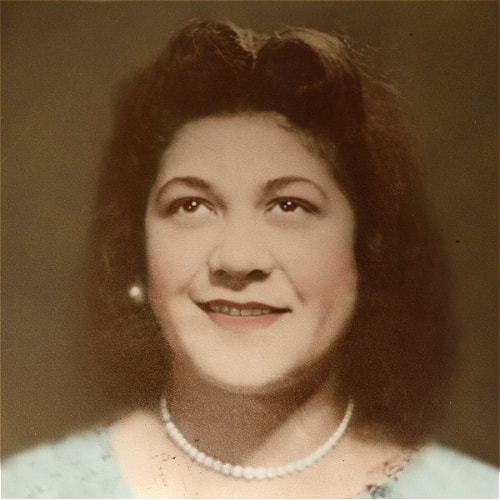Jack McGee
Blue Smoke was a massive hit, selling 50,000 copies, and yet for most of their childhood, Williams’ children didn’t know she had a singing career. One of said children, Amelia Costello, is the “head honcho” at Blue Smoke Records, and the co-writer and producer of New Blue. Her cousin, NZ television personality Sir Ian Taylor, introduces The New Blue, affectionately talking about “Auntie Pixie”. With this context, it quickly becomes clear how personal an event The New Blue is. Essentially a staging of the 2021 album The New Blue - Pixie Williams Reimagined, a covers album of some of Pixie’s most significant recordings, the show has previously toured around the country, only now finding its home in Te Whanganui-a-Tara where Blue Smoke was originally recorded and pressed. Pixie lived here for a time as well and her song Windy City plays particularly well to a Hannah Playhouse audience.
The songs are performed by three vocalists, Kirsten Te Rito, Lisa Tomlins (who both have credits on The New Blue album), and Rachel Fraser. All three are expressive, experienced, and excellent - which is essential, as we also hear recordings of Pixie herself singing, and she’s such an immense talent that any lesser singers would have crumbled under the comparison. They’re complemented by a live band, consisting of James Illingworth on piano, Jacqui Nyman on bass, Mark Sommerville on guitar, Lucien Johnson on sax, clarinet, and flute, and Cory Champion on drums. Similarly, the band performs with real class. They bring grace and dignity to the more sombre numbers, and humour and energy to the sillier, more joyful tunes.
In between songs, we’re told the story of Williams’ life by narrator Simone Kennedy. She brings a gravitas to the whole affair, telling the story (written by Costello and Meghan Hughes) with a RNZ or BBCesque authority. The script itself is enlightening, mixing personal and more broadly historical details together, to paint a picture of both Williams’ and the NZ music industry. Drawing again on my RNZ comparison, the script is somewhat dry. While the music is often vibrant, it is of its era and inherently fairly measured. It IS (or should be) your Nana’s music, and at times the whole affair feels suffocatingly professional.
Which initially, I’ll admit, is a barrier to entry for me. It’s an odd fit in the NZ Fringe lineup, after weeks of seeing plucky, experimental, boundary-pushing work, it’s a shock to walk into something as straight-forward and of its era as this. Its form is clearly targeting an older audience, which makes full sense, as they’re likely more familiar with Williams’ style of music. But honestly? With an open mind, it shouldn’t get in the way of anyone connecting with the show. The ceremony of the whole event, the sheer importance of it, wore me down. It feels odd to comment on the specifics of its craft, because New Blue feels a lot bigger than that - it feels like a purging of something long quashed.
At the centre of the show is Williams’ relationship with music, and by extension, the music industry. Filled with a deep love of singing from a young age, Williams is led by her love for music, not fame. She never pushed to be a star, and essentially ended up a recording artist under duress. The important subtext here, however, is that Williams was never, ever, financially reciprocated for her work. The choice of Aotearoa’s first real pop star to focus on her family, and leave the industry behind, plays very differently when you realise she was essentially the country’s most successful amateur. Her life was not easy to say the least, and she faced a variety of obstacles both racially motivated and due to financial issues. I’m speculating here, but I don’t think it is unreasonable to say that a cut of the revenue from her work could have drastically affected her life.
The fact that our recording industry was built on unpaid labour from wāhine Māori is one the whole New Blue project is reckoning with. On her LinkedIn, Costello writes about her job at Blue Smoke Records and the release of 2011’s For the Record: The Pixie Williams Collection 1949 - 1951 that “Now in the market, the job continues - to create awareness of the album and get kiwis buying it - not ripping it! A stunning work in progress. Love it!” While it’s funny to think that only 12 years ago there was a time where we were still optimistic about people buying albums, there’s something much more serious in this. The battle to re-assert Williams' work is not just about cultural recognition, but financial recognition as well. It’s one thing to be re-evaluated and celebrated by the public (see Williams induction into the New Zealand Music Hall of Fame in 2019) but that doesn’t undo years spent on the edge of poverty, pawning your wedding ring and buying it back regularly to feed the kids.
It was a meaningful experience for me as a back-row bystander, to experience the work and life of Pixie Williams at the Hannah Playhouse. I cannot imagine how meaningful it would’ve been to those with more of a personal connection to this music. Singing these songs live gives them real power, and both honours and resurrects the spirit of Williams. If there was a Sight and Sound list for Aotearoa popular music, I like to think that over the next decade Blue Smoke would sneak in and knock Slice of Heaven out of number one. Give it a listen, Sir Dave Dobbyn has nothing on her.
Check out Blue Smoke Records. Alongside the two albums, they’ve also released the documentary Pixie with Māori Television.






